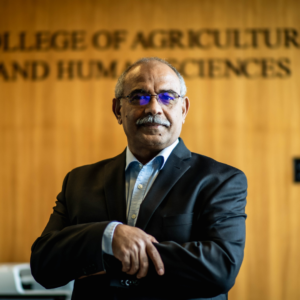PRAIRIE VIEW, Texas (June 14, 2022) Water security expert Ali Fares is taking steps to ensure minority farmers benefit from precision agriculture (P.A.) technology advancements. Fares is an endowed professor of water security and water-energy-food nexus at Prairie View A&M University. He recently earned $750,000 from the USDA-National Institute of Food and Agriculture to build Prairie View A&M University’s (PVAMU) capacity in conducting research, teaching, and training future minority professionals and farmers in the area of P.A.
P.A. is a relatively new science that increases crop yields and uses technology to assist in analysis and agricultural management decisions. The funding will allow PVAMU researchers to collaborate with another land-grant institution, the University of Minnesota, two USDA-Agricultural Research Service laboratories, and the University of California-Davis A.I. Institute for Food Systems center on the project “AI-Based Program for Advancing Research, Education and Extension Activities in Precision Agriculture at PVAMU.”
“The liaisons established between PVAMU and the University of Minnesota will further the collaborative efforts and sharing of successful use cases, implementation issues, and lessons learned,” said Co-PI Ahmed Ahmed, Ph.D. assistant professor of computer science.
Recent developments in Unmanned Aircraft System (UAS) technology and Artificial Intelligence (A.I.) approaches have contributed to the unprecedented interest in developing AI-Based UAS applications to benefit the agricultural sector. However, very few P.A. technologies are cost-effective and adequate to the needs of minority farmers. This team will use a cost-effective, integrated approach that harnesses the power of A.I., UAS, and sensor-based methods to detect, identify and quantify various crop and ecosystem stresses.
“We are focusing on plant stresses,” said Fares. “Field experiments will be conducted to develop site-specific crop responses using AI-UAS-AG tools and approaches, including smart apps introduced to farmers to help them understand how to use them and benefit from them in their operations.”
Co-PI Ram Ray, Ph.D., associate professor in the Cooperative Agriculture Research Center, stated, “This grant provides an excellent opportunity to develop precision agriculture tools that help farmers detect and manage crop stresses before it negatively impacts the crop.”
The project impacts undergraduate and graduate students with its research component and enhancement to courses offered in the College of Agriculture and Human Sciences and the computer science department. After graduation, they will be better prepared for highly technical, high-demand careers.
Fares stated, “We will introduce several models to at least eight courses. The modules will respond to urgent needs in enhancing the curricula of these two programs. Students will research and understand the theory behind the data analytics used to make decisions. They will be immersed in the innovative technologies”.
Fares and his Co-PIs will use state-of-the-art A.I. to find solutions for food security challenges faced by limited resources farmers and communities and introduce these skills to K-12 students, current professionals, and the public as part of the program’s outreach activities.
“I am excited about this project. I’m looking forward to working with the team to provide outreach, education, and training on P.A. technologies to our minority farmers across Texas,” said Co-PI Kesha A. Henry, Ph.D. Henry serves as an extension program specialist in the cooperative extension program’s agriculture and natural resources unit.
“The innovative research by Dr. Fares will impact minority-owned farms by increasing crop production while improving efficiency by saving on financial costs, said Vice President Magesh Rajan, Ph.D., P.E., MBA, PVAMU Division of Research & Innovation. “With data on factors such as irrigation, soil condition, and weather readily available in real-time, precision agriculture technology allows farmers to enhance sustainability and increase profit. The project is of particular significance as it fulfills one of the missions of PVAMU as a land-grant institution, leading to economic development using a cutting-edge research tool.”
Additional Co-PI’s on the award are Ripendra Awal, Ph.D., Mohamed Chouikha, Ph.D., from PVAMU; and Mulla David, Ph.D., Yang Ce, Ph.D., and Chiang Yao-Yi, Ph.D. of the University of Minnesota.
“I’m looking forward to using the research talent of the water-energy-food nexus program and personnel to help PVAMU build capacity in A.I. to solve challenges in agriculture, food, and water securities,” said Fares.
Karen B. Cotton MS, MA

